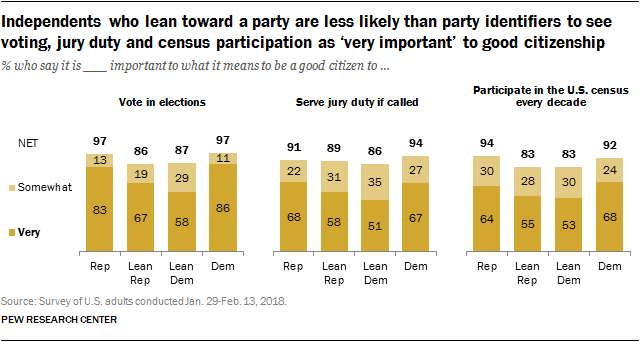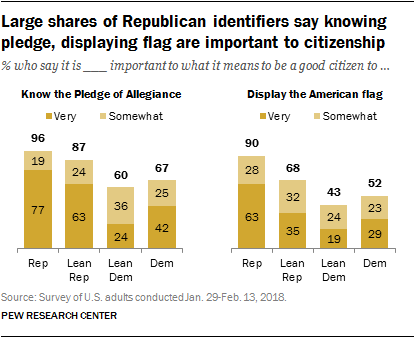 When it comes to what it takes to be a good citizen, the public has a long list of traits and behaviors that it says are important. And there’s a fair amount of agreement across groups about what it takes to be a good citizen.
When it comes to what it takes to be a good citizen, the public has a long list of traits and behaviors that it says are important. And there’s a fair amount of agreement across groups about what it takes to be a good citizen.
Still, there are differences when it comes to which aspects are considered very important (as opposed to somewhat important), and points of emphasis differ by party identification as well as by age.
Overall, 91% say it is either very (74%) or somewhat (17%) important to vote in elections in order to be a good citizen; just 8% say this is not too or not at all important.
Large shares also say it is important to pay all the taxes you owe (92%) and to always follow the law (96%), including about seven-in-ten who say each is very important (71% and 69%, respectively).
For several other traits and behaviors, about nine-in-ten say they are at least somewhat important to good citizenship. However, the share saying each is very important varies significantly. For example, 89% say it’s important to serve jury duty if called, including 61% who say this is very important. While a comparable 90% say it’s important to follow what’s happening in government and politics as part of good citizenship, a smaller share (49%) says this very important.
Protesting government actions you think are wrong and knowing the Pledge of Allegiance are considered important parts of what it means to be a good citizen, though they rank somewhat lower on the public’s list. Displaying the American flag ranks last among the 11 items tested in the survey. Still, a majority says this is either a very (36%) or somewhat (26%) important part of what it means to be a good citizen.
 Republicans and Democrats largely agree on the importance of most responsibilities of citizenship.
Republicans and Democrats largely agree on the importance of most responsibilities of citizenship.
About three-quarters of Republicans and Republican leaners (76%) and Democrats and Democratic leaners (75%) say it’s very important to vote in elections.
Similarly, comparable majorities of Republicans and Democrats say it’s very important to pay all the taxes you owe, serve jury duty if called, respect the opinions of those you disagree with and participate in the census. There also are no partisan divides over the importance of volunteering to help others and following what’s going on in government and politics.
However, Republicans (79%) are more likely than Democrats (61%) to say it’s very important to always follow the law to be a good citizen.
Knowing the Pledge of Allegiance ranks higher on Republicans’ list (71% say it’s very important) than Democrats’ (just 34% say it’s very important). In addition to placing greater importance on the Pledge of Allegiance, Republicans are twice as likely as Democrats to say it is very important to display the American flag (50% vs. 25%).
By contrast, Democrats are more likely than Republicans to think it is very important to protest if government actions are believed to be wrong: About half of Democrats (52%) this is very important to what it means to be a good citizen, compared with just about a third (35%) of Republicans.
Partisans and ‘leaners’ differ over importance of aspects of citizenship
On many items, the views of independents that lean toward one of the two major parties diverge from those of self-identifying Republicans and Democrats. In general, partisan leaners tend to be less likely than straight Republicans and Democrats to view a range of responsibilities as important to what it means to be a good citizen.
Overall, 83% of Republicans say voting in elections is a very important aspect of being a good citizen, compared with a smaller majority of Republican leaners (67%). There is an even wider 28-point gap between the share of Democrats (86%) and Democratic leaners (58%) who say this is very important.
Similarly, roughly two-thirds of both Republicans (64%) and Democrats (68%) say participating in the U.S. census every 10 years is very important to being a good citizen; slightly fewer Republican leaners (55%) and Democratic leaners (53%) say the same.
This pattern is seen across other items as well: Those who identify with a party are more likely than independents who lean to a party to say it is very important to serve jury duty if called, pay all owed taxes and to follow what is happening in government.
 While large shares of Republicans (96%) and Republican leaners (87%) say it is important to know the Pledge of Allegiance, Republican identifiers are somewhat more likely than leaners to say this is very important to good citizenship.
While large shares of Republicans (96%) and Republican leaners (87%) say it is important to know the Pledge of Allegiance, Republican identifiers are somewhat more likely than leaners to say this is very important to good citizenship.
By comparison, smaller majorities of Democrats (67%) and Democratic leaners (60%) say it’s important to know the pledge. Self-identifying Democrats (42%) are significantly more likely to say knowing the pledge is a very important part of good citizenship than Democratic leaners (24%).
There is a 22-point gap between the share of Republicans (90%) and Republican leaners (68%) who say displaying the American flag is at least somewhat important to being a good citizen. And 63% of Republicans call this very important, compared with 35% of Republican leaners. About half of Democrats (52%) think this is a very or somewhat important aspect of good citizenship; 43% of Democratic leaners say the same.
 In contrast to the patterns seen on many items, Republican leaners (81%) are more likely than Republicans (66%) to say protesting government actions you think are wrong is an important part of being a good citizen. The views of Republican leaners place them closer to those of Democrats and Democratic leaners in terms of the overall importance they place on this aspect of citizenship.
In contrast to the patterns seen on many items, Republican leaners (81%) are more likely than Republicans (66%) to say protesting government actions you think are wrong is an important part of being a good citizen. The views of Republican leaners place them closer to those of Democrats and Democratic leaners in terms of the overall importance they place on this aspect of citizenship.
Age differences in views of the responsibilities of citizenship
Young adults place less importance on many aspects of citizenship than older adults, especially when it comes to the share that describes a trait or behavior as very important for being a good citizen.
Majorities of adults across all ages say it is very important to vote in elections in order to be a good citizen. Still, a smaller majority of those under 30 say this (56%), compared with larger shares of those ages 30 to 49 (72%), 50 to 64 (76%) and 65 and older (92%).
And while fully 81% of those 65 and older say that to be a good citizen it is very important to serve jury duty if called, just about half (47%) of those under 30 say the same.
On other items, the pattern is similar. Young adults are less likely to call paying the taxes you owe, following the law, participating in the census, and following government and politics very important. Still, large majorities of young adults say each of these is at least somewhat important to being a good citizen.
 There is no meaningful age gap in views of the importance of protesting government actions you think are wrong. Overall, 85% of those ages 18 to 29 say this is either very (45%) or somewhat (40%) important to being a good citizen. Views among those ages 65 and older are similar (50% very important, 36% somewhat important).
There is no meaningful age gap in views of the importance of protesting government actions you think are wrong. Overall, 85% of those ages 18 to 29 say this is either very (45%) or somewhat (40%) important to being a good citizen. Views among those ages 65 and older are similar (50% very important, 36% somewhat important).
Displaying the American flag and knowing the Pledge of Allegiance do not rank particularly highly for young adults on their list of important characteristics for good citizenship. Among those ages 18 to 29, 63% say it is important to know the Pledge of Allegiance (38% very important) and 53% say it is important to display the American flag (19% very important). These items do not top the list of older adults either, though those 65 and older are more likely than the youngest adults to say both are important parts of being a good citizen.


 Civics Quiz: What do you know about the U.S. government?
Civics Quiz: What do you know about the U.S. government?